By Mark McGee
Fatherly advice can sometimes leave a legacy.
Such is the case for Dr. Dee Cantrell, volunteer extraordinaire for the Tennessee Walking Horse industry. She is all in when it comes to being a volunteer at a time when volunteers are hard to find.
She credits her father, Willie Richardson, with instilling in her a desire to want to step up and help others whenever possible.
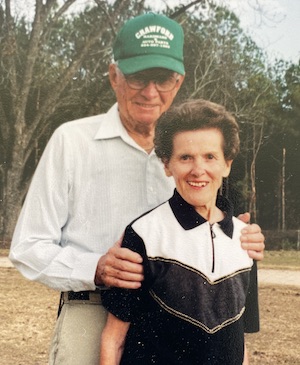
“My daddy was the driving force in me on how I want to treat people and how I want to serve,” Dee said. “He was the best daddy, and my mother Doris was the best mother.”
Every night Dee and her sister, Gloria, would sit down for dinner with their parents.
“Daddy would ask me and my sister what great things have you done for somebody today?” Dee recalled. “This started when we were four, five and six. It went on until we graduated.
“He would say as long as you are doing things for other people you get satisfaction internally. He instilled serving in us from day one by what he said and by his example.”
A mechanic and supervisor for Georgia Power for 45 years, Dee’s father not only had the willingness to help, he also had connections with people who could make things happen.
“He served people all of his life,” Dee said. “People would call at 2:30 a.m. and say they needed a wheelchair. By 8 a.m. the wheelchair was there.
“He was phenomenal. Everybody wanted my daddy to be their daddy.”
He advised his daughters they might not always meet their goals, but they had to make the effort.
“One time I was distressed about something that didn’t happen the way I thought it should,” Dee said. “I was really torn up.
“He took my hand and said let me ask you one thing. ‘Did anybody die?’ I said, ‘no.’ He said, ‘then we can fix it.’ From then on, I just had a calmness about me. He could put things in perspective. He was the best mentor I have ever had in my life.”
Dee has been a volunteer for the Walking Horse Trainers’ Association for 54 years. She has worked with 21 different presidents of the WHTA including the late Vic Thompson, the first to hold the office in 1968. She has also mentored and helped train the past three secretaries for the WHTA.
She has been a member of the WHTA Auxiliary since it started in 1971 working the silent auctions during the Trainers’ Show, the WHTA Blue Ribbon Horse Sale at Wiser Farms the final Saturday of The Celebration, the National Trainers’ Show and the Money Tree Classic horse show.
The auxiliary also provides several scholarships each year for young people involved in the walking horse industry who want to continue their educations.
“We do a lot of great things in the Auxiliary,” Dee said.
A Tennessee Walking What?
Dee admits that until she met her husband, Bill, the Tennessee Walking Horse breed was a mystery to her.
“I knew nothing…minus zero…zilch,” Dee said.
Her first impression of a walking horse was one of amazement.
“I guess everybody is amazed at the big lick,” Dee said. “I was impressed with how beautiful they are and how tame and nice they are, even the aged horses.
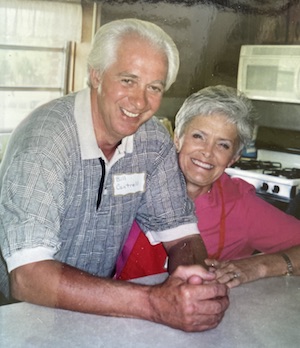
“The talent of some of them is unbelievable, especially now. They have to have talent to do what they do.”
While she didn’t know very much about walking horses she was aware from the beginning a trainer’s life has its ups and downs. She was prepared for both the good times and the bad times.
“I knew when we got married it was not going to always be a rosy road with him being a horse trainer,” Dee said. “We have worked hard.
“I have always been someone who will support anybody, I support my husband 10,000 percent.”
While she prefers being in the background, she has ridden walking horses in competition. In 1983 she won the world grand championship in the 15.2 & Under Amateur class aboard Delight’s Copy C.
“I enjoy riding, but I prefer to be a cheerleader,” Dee said.
Their home, located near the training barn, in Phenix City, Alabama, is the only home the Cantrells have ever lived in. Again, her father was an enormous influence in Bill not going from barn to barn as some trainers do.
“My daddy said I want to keep my daughter at home,” Dee said. “I don’t want her to leave Phenix City, Alabama.”
He asked Bill what he could do to make sure his daughter would never leave Phenix City.
“Bill said, ‘I am going to be a horse trainer and I have to have a barn,’” Dee said. “Two years earlier Daddy had bought 165 acres about 10 miles from our house. He rode out there and asked Bill, ‘Where do you want your barn built?’”
Bill had nine horses in training at the time with 22 stalls. Dee had just turned 21.
“Daddy took a leap of faith in us,” she said. “He never knew we would be married 54 years or Bill would be a success as a trainer.
“We have 75 stalls. We have enjoyed our time. I know we are on the getting out end. Bill is going on 80. I am going on 76. But we still have the hearts of 30 years of age and that is what counts.”
Pioneer in AIDS treatment
“I set up the first AIDS clinic in Columbus, Georgia, in 1980,” Dee said. “Nobody wanted to touch those people. No one wanted to even be in a room with them.
“I had patients coming to Columbus from five different states. We couldn’t see them all in a day. It was unbelievable.”
Dee received her medical degree from the University of Alabama-Birmingham (UAB), one of two doctorates she holds. The other is in education from Auburn University. She worked as a family practitioner for the State of Georgia Department of Health, serving 15 counties, until retiring in 2005 after 36 years. She served 15 counties.
“I don’t know why I started it,” Dee said. “The good Lord just said this is your calling right now to take care of these people.”
In 1980 the world was just becoming familiar with HIV-AIDS. It would be 1985 before the first test would be available.
“I started my clinic because we were seeing all these patients who were infected and had symptoms. My first five patients were all gay. I did the eulogy for all five of them.”
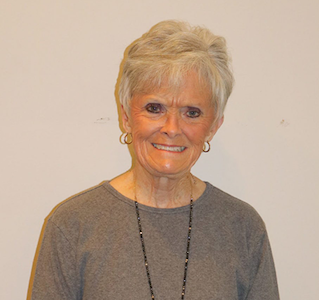
One of the five was also married with two children. Dee, at the request of the patient, had to help inform the wife of her husband’s diagnosis. He died 18 months from that day.
“I helped her get a life insurance policy on him,” she said. “She got a $1million life insurance policy though an uncle. The kids went to college with that money, she set up housekeeping and remarried. She is doing great. “I get a Christmas card from her every year. Last year she sent me a beautiful card and said she couldn’t thank me enough. You never know what impact a little something is going to have.”
Dee is drafting a book, Coloring Outside the Lines, based on those first five patients. It has been an emotional effort for her.
“In the first contact I had with them, I gave each of them a journal,” she said. “I told them I wanted them to make four entries every day in their journals for as long as they live. I wanted them to tell me how people treated them and how did they feel about having what they had.
“I have all of their data. They did color outside the lines. I am on chapter three, but it is so hard to read all the stuff they wrote and see how hurtful and horrible things were for them.” Back in the day life expectancy was 15 to 18 months after diagnosis.
Her progress on her book has also been slowed due to her coming out of retirement a day after she left the State of Georgia.
“I work for the State of Alabama setting up wellness programs,” Dee said. “We go onsite to perform all the exams and tests. It is in its 17th year.
“I work with all the school systems and all state facilities. It is broken down into regions. I have my own region of the world where I go and do the exams and screenings twice a year. My sister has helped me with this. I work with 10 people who are wonderful. We have saved so many lives.”
23 degrees of education
It is an accomplishment she prefers to downplay, but Dee has received 23 degrees, including three masters and two doctorates. She has obtained them from several schools – UAB, Emory University, Columbus State University, Columbus College and Auburn University.
“I love school,” she said. “I went to college for 23 years after high school. I love to learn. I just kept going to school. I loved every minute of it.
“My daddy always said to me and my sister that we were both going to college, and we were both going to excel in whatever made us happy. He told us he wanted us to excel because he wanted us to be able to stand alone if we ever had to be alone.”
Just like she was always going to be a volunteer, she also had a lifelong dream of a career in medicine beginning as a candy striper in high school.
“I started out as a nurse,” Dee said. “It is about care giving. That is within you. You can’t cultivate it and make it happen.”
One of her greatest memories is about a mother whose daughter was diagnosed with spinal bifida. The father was taking care of the baby. The mother refused to touch the child.
“They were a young couple, “ Dee said. “I felt sorry for them. I latched onto them, making several home visits.
“I thought, ‘I had to get the mother to bond with her daughter, Missy.’ I picked her up and cuddled her and kissed her. I told the Daddy to leave. I then told the mother I was having stomach problems and she had to take the baby. I stayed in the bathroom for 15 minutes. I walked out and it was the sweetest sight I had ever seen. The mother was cooing and talking with her child. That mother became her daughter’s best warrior. I am the most proud of that one day when I helped them form that bond.”
Dee also taught at Emory. She was able to remain in Columbus, with her students being sent to her classes from Atlanta.
“I taught there for several years,” she said. “The health department allowed me to work with the students.”
Reigniting a youth movement
As vice president of the Youth Division for the Tennessee Walking Horse Breeders’ and Exhibitors’ Association, Dee has been addressing a major concern for the industry – a need to attract more young people.
“We proclaimed 2022 as the `Year of the Youth’ and I am so proud of that,” she said. “This year we have gone from 34 members to 257 youth members. The youth program at the Breeders’ Association is just bursting at the seams. It is amazing.”
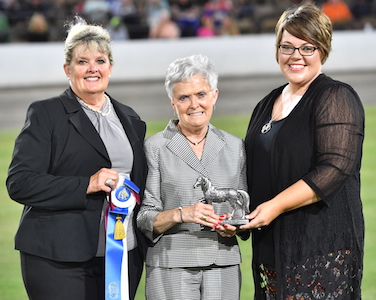
Her goal, with the help of her committee members, is to steer children into a productive interest in the Tennessee Walking Horse.
“They are the future of our industry,” Dee said. “You have to mentor them. You have to make things happen for them. You have to go to them. You can’t wait for them to come to you. You have to seek them out.
“They are on their phones or their computers all the time. They need a diversion. We are trying to provide that.”
She credits Mark Farrar, executive director of the TWHBEA, for his support in the youth initiatives.
“Mark has been a great asset,” Dee said. “He has hung with me, and I have hung with him. We have all worked together. It has been great.”
One of the strongest influences on the youth in the breeders’ association is owner and rider Sister Milligan from Panama City, Florida.
“We asked all of our youth to tell us one person in the industry they liked more, respected more and looked up to more,” Dee said. “Three-fourths of them said Sister Milligan.
“We asked them why? They said she is always smiling. She never gets mad. She is happy with whatever she gets. That is a testimony right there.”
This year for the youth at The Celebration, TWHBEA is sponsoring for the youth this year "Lunch with the Legends". It is FREE and open to all youth and will be held August 28th from 11-1pm in the Hall of Fame Club in the Calsonic. So guess who is one of the Legends will be appearing...yes...Sister Milligan.
Online entry office services
For 17 years Dee and Rob Fikes have helped horse shows through their Entry Office Services business.
“I had this vision that started with the inaugural Delta Fall Classic in Tunica, Mississippi, in 2005,” she said.“ Rob created the system. I can think what I want and know what I want, then he creates what I want.
“I have always loved being behind the scenes working at shows. I just thought this was a way we could do it better and faster.”
In 2019 they started the online entry system, which can be found at entermywalkinghorse.com.
They work with approximately 25 shows annually. Most are multi-night shows, but some one-night shows are also part of the system.
“Rob is an outstanding computer person,” Dee said. “I realized we could do all the entries for shows online and we created our system.
“We also provide accounting assistance. The accounting system is done manually and captures all the information you would need.”
Dee oversees the scoring when there are three judges working a show. There is an online component, but she also does the scoring by hand.
“If the computer goes down you have to have someone who can manually do that,” she said. “Charlie Tisher (longtime Celebration ring clerk) was my mentor. He let me shadow him for two years. You have to know what you are doing, and he is the best of the best. I am very blessed to have been taught by the best.”
The system has received rave reviews from those who have used it.
“This online system has worked, and everyone who uses it is benefiting from it,” she said. “Some trainers were a little hesitant, but when they used it one time, they were sold on it. Overtime they have built a confidence in us that we will do it right. Our best advertisement is by the people who use our system.
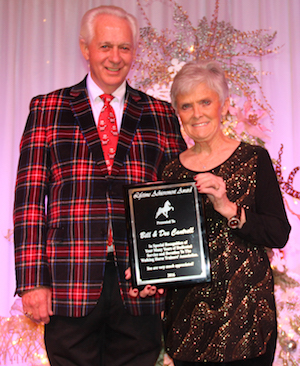
“We handle all of the paperwork at the shows we attend. There is no more handwriting of entries. There are a few trainers who don’t use the system, but at the shows we work, 95%-98% of the entries are done online.”
They are a show manager’s dream generating DQP reports, paddock master reports, an announcer’s notebook, a results report, show summary and results by trainer. Their payback system creates prize checks based on trainers, eliminating the need to attach checks to ribbons.
“We also do the show manager’s report and the Riders’ Cup report,” Dee said. “We send class results after each class to media outlets to be posted in real time.
“It is not just the entries, but what we do after the show that counts. We take care of everything.”
Her love of the breed and being a supportive wife of a trainer all give her the incentive to look at ways things can be done better.
“We just love doing this,” she said. “I am on the side of the trainer because I am a trainer’s wife. It is always a matter of how we could help them do things better.
“My goal is to be a resource person for this great industry. It is such a small industry, but it offers such great wholesome family activities. I just wish we could have harmony and we could all be able to enjoy it.”